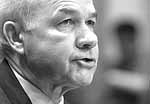 |
Kenneth
Lay refuses to testify to Congress about Enron scandal WASHINGTON — Kenneth Lay, the presidential pal who built Enron into a darling of Wall Street only to see it collapse in scandal, exercised his constitutional rights Tuesday and refused to testify to Congress. “I am deeply troubled about asserting these rights,” Lay said. “It may be perceived by some that I have something to hide.”
But he said his attorneys had advised him not to testify. “I cannot disregard my counsel’s instruction,” he said. In a brief statement, Lay expressed a “profound sadness” about what had happened to Enron. Before being called to the witness table, Lay sat glumly as he was criticized by senator after senator for maintaining his silence. “Obviously Mr. Lay, the anger here is palpable,” said Sen. John Kerry, D-Mass. William Powers, an Enron director and dean of the University of Texas Law School, who led an internal company investigation, later testified that documents shredded at Enron’s Houston headquarters may have contained financial information that congressional investigators were seeking. “There may be information on those documents that were shredded that would have helped,” Powers told the senators. He also said Lay approved partnership arrangements by senior executives, noting that in one instance, “Mr. Lay had signed off on a deal approval sheet” for a related transaction. Lay “bears significant responsibility ... for Enron’s failure to implement sufficiently rigorous procedural controls to prevent the abuses,” Powers said. Lawmakers said they had a wide array of questions for Lay, who resigned Jan. 23, about the Enron bankruptcy and its devastating impact on millions of American investors and thousands of company employees. “I thought you would think it was important to answer those questions, too,” said Sen. Peter Fitzgerald, R-Ill. “Apparently you didn’t think it was the least you could do.” Fitzgerald called Lay an “accomplished confidence man.” He chastised Lay for not acting on the warning Enron executive Sherron Watkins gave him last August that the company faced potential accounting scandals. Watkins is scheduled to testify voluntarily Thursday at a hearing of a House Energy and Commerce subcommittee that is investigating Enron’s collapse. Said Sen. Byron Dorgan, D-N.D., “Trust was broken in this case. We need to put the pieces together to find out what happened.” Lay sat in a front row of the crowded hearing room, barely moving, his hands at times pressed against his knees. His daughter, Liz, sat one row behind him but his wife, Linda, who has publicly defended him and called him a victim, was not at the hearing. His attorney, Earl Silbert, said afterward that Lay had “agonized very deeply” about not testifying but that he had insisted Lay assert his constitutional protection. Powers disputed congressional testimony last week by Jeffrey Skilling, Enron’s former chief executive officer, that he knew few details of controversial partnerships. “I think there’s substantial evidence that Mr. Skilling was involved,” Powers said in response to senators’ questions. Key lawmakers said Sunday they did not believe Skilling’s testimony. Powers also testified that Enron’s longtime auditor, the Arthur Andersen accounting firm, was fairly uncooperative with his investigation. “They basically made excuses that there were other demands on their time,” he said. In one case, he noted, Andersen officials allowed Powers’ colleagues to hand copy a list of 50 names of investors in Enron partnerships — a document not available from Enron — but would not provide copies of it. Lay was the most visible symbol of Enron Corp., which was ranked as the nation’s seventh-largest company before it crumbled into bankruptcy on Dec. 2. He joins five other men — including Enron’s former chief financial officer — who have cited the Fifth Amendment right against self-incrimination and declined to testify in Congress’ deepening inquiry. Lawmakers reject the idea of offering immunity from prosecution to get them talking, at least for now. Lawmakers say Lay sat atop a house of cards as a clique of executives enriched themselves at the expense of employees and investors. A complex web of thousands of partnerships was used to keep some $500 million in debt off Enron’s books and hidden from investors and federal securities regulators — pumping up the stock price. Officials of Houston-based Enron reaped tens of millions of dollars from the partnerships. Lay was a man with unrivaled access to Washington policy-makers and met privately on energy policy with Vice President Dick Cheney last spring. Lay, who gave employees $50 bills when Enron’s stock reached $50, promoted his company’s prospects with an evangelist’s fervor and he was still urging Enron workers to buy shares a month after he was warned of potential accounting scandals. Employees and retirees lost millions as Enron's stock price plunged — from around $83 a year ago to less than a dollar in late November — and they were stripped of the bulk of their retirement savings in accounts loaded with company stock. Investors large and small around the country were burned. President Bush, lawmakers and politicians of both parties who welcomed Lay’s generous political donations now keep their distance. |
|||
|
TCU Daily Skiff © 2002 |
||||


